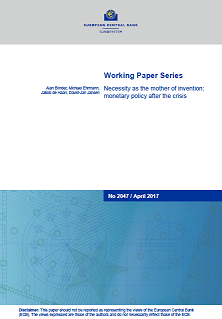Efstathiou, Konstantinos, Wolff, Guntram B., (2017), “How export growth achieved adjustment of massive trade deficits in the euro area”, Bruegel, 31 Μαΐου The reduction of current account deficits in euro-area countries since the 2008 crisis is strongly driven by increases in exports that dampened the effect on production of the fall in demand and imports. Σχετικές Αναρτήσεις Eurostat/Euro area international trade in goods surplus €30.9 bn/16 Μαϊου 2017 Petroulakis, Filippos, (2017), «Internal …Read More
Solving Non-Performing Loans in Europe to speed up the recovery
Beynet, Pierre, (2017), “Solving Non-Performing Loans in Europe to speed up the recovery”, OECD ECOSCOPE, 23 Μαΐου Almost 10 years after the outset of the financial crisis in summer 2008, European growth remains modest, constantly underperforming the OECD average. Several factors explain this disappointing performance. The pace of fiscal consolidation was rapid in the countries most affected by the crisis while structural reforms were not sufficiently pursued in other countries. …Read More
Democracy without choice: Citizens’ perceptions of government autonomy during the Eurozone crisis
Ruiz-Rufino, Ruben, Alonso, Sonia, (2016), “Democracy without choice: Citizens’ perceptions of government autonomy during the Eurozone crisis”, European Journal of Political Research, 56(2), 320-345, 30 Δεκεμβρίου In this article it is argued that citizens take into account the degree of a government’s political autonomy to implement particular policies when expressing their views on satisfaction with democracy (SWD) but, in order to do so, they need to perceive it. When citizens …Read More
The use of the Eurosystem’s monetary policy instruments and operational framework since 2012
European Central Bank, (2017), “The use of the Eurosystem’s monetary policy instruments and operational framework since 2012”, ECB, Μάιος 2017 The purpose of the Eurosystem operational framework and its monetary policy instruments is to implement the monetary policy decisions of the Governing Council of the European Central Bank (ECB). The task of monetary policy implementation is decentralised and therefore involves, in addition to the ECB, the national central banks (NCBs) of …Read More
Persistent economic slowdown and emergence of debt-ridden borrowers
Kobayashi, Keiichiro, (2017), “Persistent economic slowdown and emergence of debt-ridden borrowers”, VoxEU, 2 Μαΐου There is concern about the persistent slowdown of economic growth in the aftermath of financial crises. This column presents a framework which shows that excessive debt accumulated by firms and households during a crisis can cause persistent stagnation. Relief from excessive debt has a direct impact on economic growth, whereas unconventional monetary and fiscal policies cannot directly …Read More
From EU Governance of Crisis to Crisis of EU Governance: Regulatory Failure, Redistributive Conflict and Eurosceptic Publics
Borzel, Tanja, A., (2016), ” From EU Governance of Crisis to Crisis of EU Governance: Regulatory Failure, Redistributive Conflict and Eurosceptic Publics”, Journal of Common Market Studies 54(S1), 8-31, 16 Αυγούστου Financial crisis, euro crisis, Greek crisis, Crimean crisis, Ukraine crisis, Syria crisis, migration crisis – even the greatest optimist cannot deny that Europe has been suffering through a whole series of crises ever since the Lehman Brothers bank collapsed …Read More
Drivers of the post-crisis slump in the Eurozone and the US
Kollmann, Robert, Pataracchia, Beatrice, Raciborski, Rafal, Ratto, Marco, Roeger, Werner, Vogel, Lukas, (2017), “Drivers of the post-crisis slump in the Eurozone and the US “, VoxEU, 27 Απριλίου The Global Crisis led to a sharp contraction and long-lasting slump in both Eurozone and US real activity, but the post-crisis adjustment in the Eurozone and the US shows striking differences. This column argues that financial shocks were key determinants of the …Read More
Rising Hopes in the European Economy Amidst Global Uncertainties
Benczes, István, Szent-Iványi, Balázs, (2016), “Rising Hopes in the European Economy Amidst Global Uncertainties”, Journal of Common Market Studies, Ιούλιος The aim of this contribution is to analyze Europe’s economic performance, focusing on the developments in 2015, but also placing them in a broader context. Just like our contribution to the previous year’s Annual Review (Benczes and Szent-Iványi, 2015), this piece on the European economy focuses not only on the …Read More
Which Budgetary Union for the E(M)U?
Da Costa Cabral, Nazare, (2016), “Which Budgetary Union for the E(M)U?”, Journal of Common Market Studies 54(6), 1280-1295, 30 Ιουνίου This article considers whether the creation of a budgetary union in the European EMU (economic and monetary union) is a feasible and suitable way to resolve the current impasse created by the euro crisis. The article begins by identifying the major drawbacks concerning the transposition of prescriptions regarding fiscal federalism …Read More
Necessity as the mother of invention: monetary policy after the crisis
Blinder, Alan, Ehrmann, Michael, de Haan, Jakob, Jansen, David-Jan, (2017), ” Necessity as the mother of invention: monetary policy after the crisis”, ECB Working Paper Series No 2047, Απρίλιος We ask whether recent changes in monetary policy due to the financial crisis will be temporary or permanent. We present evidence from two surveys—one of central bank governors, the other of academic specialists. We find that central banks in crisis countries are more likely to …Read More





